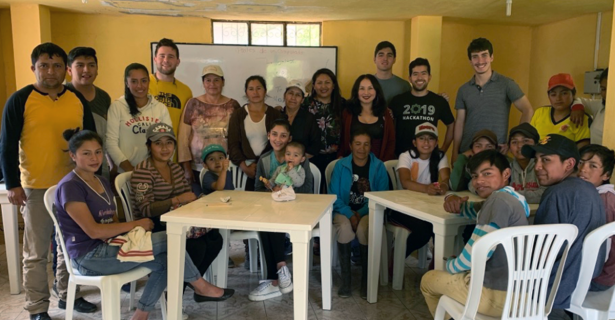Our Tufts International Development (TID) group had just finished up our work in San Jose de Minas, a small town located 50 miles north of Quito, Ecuador. During our time in Minas, we were able to check in on one of our current projects at Colegio San Jose de Minas, the local K-12 school. The previous summer, our focus on educational technology prompted the installation of the Koombook, an e-library kit that provides remote communities, without the internet, access to web-based resources. On that trip, our team installed Koombook Programs in both Minas and Jatumpamba, a rural village about 30 minutes outside of Minas. Following our time in Minas, our next task was to travel to Jatumpamba where we would be meeting with students and community members to evaluate the project.
When we first arrived in Jatumpamba, I was taken by surprise as to how rural the area really was – all that existed in the “center” of town was a school, which also served as the community center.
The previous summer, our team had chosen to implement a program in Jatumpamba because of its extreme isolation – this isolation creates many educational related problems. For students in Jatumpamba, students have to travel via crowded vans on journeys as long as 40 minutes each way to school. This distance, combined with the lack of access to technology and the internet, discourages school engagement and is believed to lead to higher drop-out rates. Thanks to our partner Ecuadorian NGO, FONAP (National Farming Forum), we were able to seek out Jatumpamba and provide the area with a Koombook. With the programming in place, both students and members of the community have been able to access resources like Wikipedia, Khan Academy, 20,000+ books, college entrance exams, and many other educational tools and programs.
During this time at the school, we were able to discuss with both the students and community members how we could make the program more effective and compatible with their needs. Part of our work for this upcoming school year will be to process the feedback we gathered and to continue to adapt the program. During our open discussion, people shared their thoughts on the Koombook and their overall gratitude toward the changes it had brought about in their community. One of our biggest takeaways from the talk was an emphasis on including more material for college preparation, which we decided is another project we will tackle this fall.
Overall, students and community members in Jatumpamba have taken full advantage of the resources we have provided, and it was rewarding to see this firsthand. As we continue to work with isolated communities like Jatumpamba and Minas, we hope that our commitment to providing educational opportunities will continue to have a positive effect on both their personal and professional aspirations. In the future, it is critical that we continue to safeguard the program’s sustainability and the evolving needs of the communities we support.

